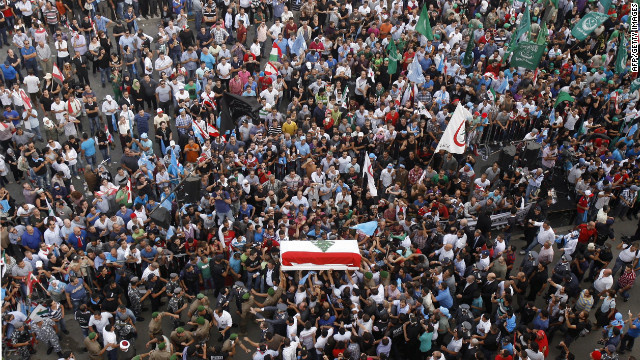Lebanon: Unity, the Victim of Pluralism

It has been some time that insecurity, instability and violence have become part of the political life of Lebanese people who have been used to this matter for many years. Terror and explosions are not at all new issues in the heart of the Lebanese lexicon. They can be frequently repeated in the East or the West, the North or the South of the country and their victims can be presidents, heads of government, ministers, parliamentarians, security, political, cultural and media personalities, ambassadors, and even religious leaders. When tranquility and calm are materialized, it is now Israeli fighters' turn to break the sound barrier which has almost become a normal issue for the people, particularly in Southern and Western Bekaa.
Terror and violence are definitely committed for political objectives. Most groups use this tool against each other and its important factor is the division of the country based on political tribalism. This issue has caused the intervention of all countries in Lebanese affairs. It reaches a point where foreign forces' exigencies dominate domestic exigencies; national interests become dependent on the other's exigency and local forces probably become tools at the service of foreign interests and the tribe's importance goes further than the country and nationality.
With the terror of Wissam al-Hassan, the head of the Lebanese internal security agency, the Lebanese people were once again caught in terror so that the internal complexities of political and tribal groups were once again opened. The main element of accusations is usually taken from political mentality and inclination. It is probably introduced in a hasty manner which is naturally a part of the nature of extremism.
Supporters of the resistance, as is the March 8 Alliance, introduce Israel as the source of terror, chaos, tribal conflict, and ultimately civil war, while supporters of the March 14 Alliance and the Al-Mustaqbal Movement, which are today against the government, point the accusation toward their old enemy, the Bashar Assad regime. They have called for the resignation of Najib Mikati as the Prime Minister who was introduced in accordance with the will of the March 8 Alliance and supporters of Syria. While part of the opposition were performing the burial ceremony of Wissam al-Hassan in Martyr's Square in Beirut, hundreds of meters away from that ceremony, some others attacked the Prime Minister's palace and called for the resignation of Mikati. However, today the question is different from the past. Syria's developments and its ups and downs have found regional and extra-regional dimensions. Conditions for government change in Lebanon are dependent on these surrounding developments, and different factors such as extra-Lebanese agreements have seriously been involved in it.
Let us review the political scene of the past two days in Lebanon; Hillary Clinton and Laurent Fabius, the Foreign Ministers of the US and France, have, separately, contacted Najib Mikati, following the attack of the opposition against the Prime Minister's Headquarters, and reiterated the political stability of Lebanon under present conditions. This is an issue which shows international support for Mikati. The Americans and Obama are faced with a decisive election within the next few days, for which the political stability of Lebanon bears high importance. Furthermore, the ambassadors of Britain, Italy, and the European Union have also met with Mikati carrying the same message. In addition, there seems to be disunity inside the opposition. The positions of the Hariri Sunnis contradict those of the March 14 Christians and Walid Jumblatt. In a statement, Saad Hariri has considered changing the present government as the only path to save Lebanon, and, during the funeral ceremony of Wissam al-Hassan, Fouad Siniora stated that Mikati’s resignation and the fall of his government is the only way to end the violence, a statement which by itself incited the attack against the government's headquarters.
But, in a different reaction, Walid Jumblatt, who is in the same anti-Syria front, believes that everybody must gather around this government, and the best way to remember Wissam al-Hassan is to support his government and his intelligence organizations to find the assassin, despite his direct accusation against Bashar Assad as being responsible for Wissam al-Hassan's assassination. What surprised the observers was the non-participation of the opposition in the funeral ceremony of Wissam al-Hassan. The low participation and disorganization of the programs and official ceremonies strengthened the suspicion that, although the opposition strongly believes that the Syrians are behind the assassination of Wissam al-Hassan, they have differences of opinion in dealing with the present situation.
The above-mentioned elements can be a reason to prove the point that the necessary determination to disrupt the general security situation and a potential all-out tribal war in Lebanon does not exist, neither among the impacting foreign parties, nor among the domestic opposition of the government; even though the grounds are completely prepared for that. The presence of the army in the internal circle, as the element of power and security during recent days and the measures taken by the political and religious leaders to return calm and prevent tribal conflicts and spread of insecurity, are of considerable importance.
Finally, the domestic developments and events of Lebanon are so complicated that they cannot easily be analyzed; as, due to the same reason of the complication of the domestic scene and its relations with regional and international developments, an immediate accusation against any party, as the executing party of Wissam al-Hassan's assassination, can be a hasty decision.

